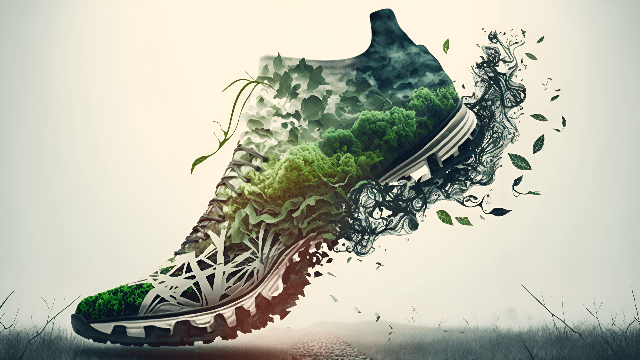Reflets Magazine #149 | How Do We Reduce the Environmental Impact of Sport?
Sports equipment not only contains polluting components and requires a great deal of resources, it also generates vast amounts of waste, with numerous products which are purchased and then underused, or on the contrary, deteriorate too rapidly and are thrown away prematurely. Reflets Mag #149 devotes a feature to new fields in sport, and takes a look at the solutions presented by Félix Banvillet (E17), Bertrand Reygner (M00) and Boris Pivaudran (E14) to counter the ecological impacts of the sector. Here is a free online translation of the article… subscribe to get the next issues (in French)!
Félix Banvillet (E17), Sustainability Officer at Decathlon Australia
‘Here at Decathlon, the production and transport of goods account for 86.5% of emissions, so this is our priority area of action. We adopted the EcoDesign approach in particular, which aims to uses fewer manufacturing resources, in addition to improving reparability, and already concerns a third of our range. 84% of our retail outlets are supplied with renewable energy. Our goal for 2026 is to attain 100% recycling of waste and 100% of salaries with a variable portion indexed to climate performance.’ This is a concern shared by numerous players in the sector. ‘We’re seeing a clear rise in the use of natural fibres rather than polyester, a move that has become a core focus for brands such as Patagonia or Picture. It is more difficult to decarbonise bicycles, but brands are working on the reuse of frame steel or tyre rubber.’
However, there is no worldwide consensus on environmental targets to reach for the sector, and there is an obvious risk of greenwashing. ‘I believe Australia is an example to follow in this regard. We’re not allowed to use the terms “eco-friendly” or “carbon-neutral” here, nor add leaves to logos. Communication must be humble and scientifically grounded with publicly available figures.’
There is still plenty of room for improvement. ‘I strongly advocate the development of circularity. Sports equipment (e.g. camping, hiking, kayak or kids’ bicycles, etc.) is ideally suited to this economy of use, which is being driven by start-ups such as Campsider or Biked. It is in the best interest of major groups to work with these partners, while fighting their own in-house battles.’
Bertrand Reygner (M00), Technical and R&D Director at Ecologic France
150,000 tonnes of sports and leisure items enter the market every year. ‘This in turn represents an estimated 90,000 tonnes of waste.’ The eco-organisation Ecologic France was granted authorisation to manage the end of life for such products. ‘We act in several areas. Firstly, we certify repairers and offer a financial incentive to consumers who call on them, in the aim of boosting the use of their services by 18%. Secondly, we have a listing of more than 200 reuse players, who we support with the goal of offering a second life to 8,000 tonnes’ worth of items in 2024. Thirdly, we work alongside some 900 shops and 1,200 waste collection sites, and organise collections in ski and beach resorts or sports venues, to reach 30,000 tonnes of waste in 2024. Lastly, we dismantle objects and recycle any possible material in our treatment plants. Through R&D, we seek alternative solutions for non-recyclable sports & leisure items.’
Manufacturers and distributors are also engaging in this drive. ‘Some organise the in-house recovery of sports equipment to reuse components in the manufacture of new products. Ecologic lends its support via the producer-recycler scheme.’ Professional organisations, such as the Union Sport et Cycle, GIFAP, SNAFAM, FIN, OSV, Eurosima, FFCM, the Ministry of Sports and CNOSF also act as intermediaries between economic players and athletes.
‘France is a pioneer in the management of sports equipment end-of-life. We are the only country to have created an extended responsibility branch in this sector. Elsewhere and at the very most, there is a private initiative in Italy to recycle ski boots, but it is still at the R&D stage.’
Boris Pivaudran (E14), founder of Masherbrum
‘Outdoor textile is currently dominated by 100% synthetic. We aim to prove that you can combine performance, comfort and eco-design.’ Masherbrum thus offers mountain clothing with a minimal environmental impact. ‘We work with alternative matters sourced from either recycling, organic farming or closed-circuit production, such as our wood cellulose fibres from sustainably managed forests. We reduce or withdraw treatments, coatings and dyeing, design our models to limit the number of pieces to be sewn and optimise cutting to avoid fabric waste. Our weaving, knitting, dyeing and sewing operations are centralised in a single geographical area to minimise inter-factory transport, i.e. Braga in north-east Portugal, which also offers the advantage of a 63% renewable energy mix. We select strict certifications, such as Bluesign®, GOTS, Reach, Oekotex Standard 100, Fair Wear, FSC or PEFC. For every product sold, we donate €1 to the Mountain Wilderness charity for the protection of mountain species, and we plant a tree in the Centre-Val de Loire region with the non-profit group Duramen.’
The brand also builds awareness via its blog, with fact-checkers such as: ‘Misconception n°1: natural materials offer no guarantee of eco-responsibility; this depends on their source and level of processing. Misconception n°2: a bio-sourced product is not necessarily biodegradable, and a biodegradable product is generally only that in industrial landfill conditions. Misconception n°3: a ‘Made in France’ label on a textile item only means that the final stage of manufacture took place in France; the item may well contain fabric woven and dyed in Turkey, which was initially spun in China with Uzbek cotton.’
Interview by Louis Armengaud Wurmser (E10), Content Manager at ESSEC Alumni.
Translation of an article published in Reflets Magazine #149. Read a preview (in French). Get the next issues (in French).
Image : © AdobeStock

Comments0
Please log in to see or add a comment
Suggested Articles




